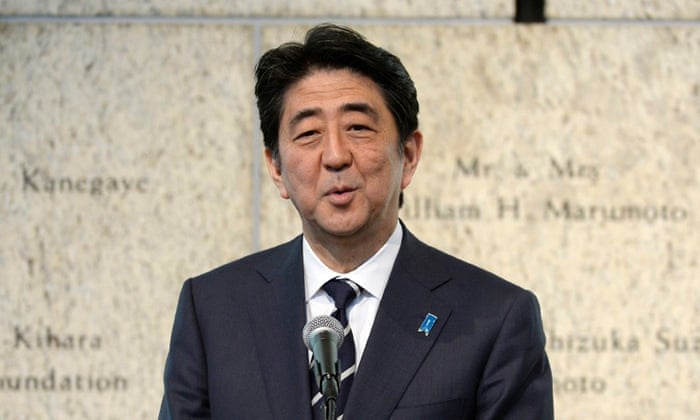
US and Japan call for stronger ties during Shinzo Abe’s visit to California, which sees protesters demanding apology for sexual slavery during second world war.
Japan’s Prime Minister Shinzo Abe wrapped up his US visit on Friday in Los Angeles, where he shared his vision for strengthened economic and political ties between the two allies.
At a Japan-US economic forum in downtown Los Angeles, Abe spoke of an “alliance of hope” that included growing investments and closer business and political ties.
US commerce secretary Penny Pritzker said the United States and Japan will work toward promoting more direct investment in each other’s markets and approval of a Pacific trade agreement.
“We must reinforce an economic architecture that will shape and secure our future,” Pritzker said.
“There are two essential cornerstones of that architecture: increasing two-way investment and deepening trade” through a trans-Pacific agreement, she said.
At an earlier luncheon, Abe said there is a “synergy across the Pacific Ocean” between the nations, and he alluded to strengthened defense ties with the USamid Japan’s perpetual feud with arch-rival China.
Since winning election in December 2012, Abe has been a strong advocate of closer ties with the US. His remarks came near the close of a three-day swing through California after meeting earlier in the week with President Barack Obama in Washington, where Abe said the US and Japan must take the lead in completing a 12-nation trans-Pacific trade pact.
He arrived in the US during a Washington battle over legislation that would give Obama the authority to negotiate the Trans-Pacific Partnership, or TPP, a cornerstone of his second-term agenda. In a reversal of politics-as-usual, it is Obama’s own Democratic base that opposes him and Republicans who support the deal.
Pritzker told the forum, which included leaders of US and Japanese businesses, that the Obama administration is “all-in on TPP”. She said the pact would be the most effective mechanism for paving the way to even stronger economic ties.
Outside the event, about 100 people chanted and held signs demanding an apology for the sexual enslavement of tens of thousands of Asian women by Japan’s imperial army during the second world war. The protesters, many of Korean or Chinese descent, shouted “Abe, liar!” and held signs reading “Mr Abe, official apology.”
The prime minister expressed “feelings of deep remorse over the war” during an address to Congress, but that didn’t satisfy critics, who say Japan hasn’t done enough to account for wartime abuses. Japan maintains that it already has apologized for the “comfort women”.
Abe later appeared at a wreath-laying at the Go For Broke Monument, which honors Japanese-Americans who served in the US army during the war.
On Friday evening, he and his wife, Akie, attended a reception with former US Secretary of Transportation Norman Mineta, with actor George Takei among the guests.
They were scheduled to depart for Japan on Saturday.
S0urce: The Guardia






























